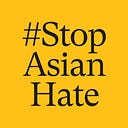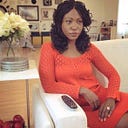How Korean Food Led to Self-Love and Then True Love
A curiosity for other cultures led author Africa Yoon through a transformative weight-loss journey — and to her husband.
I came to the United States when I was six. My father was appointed ambassador to the United Nations for my country of Cameroon, which is why we moved. I asked my mum: “What is the United States?” She explained to me the concept of immigrants and the mixing bowl. Well, in my six-year-old mind, I thought the United Nations and United States were the same thing. So, at the United Nations in my papa’s office, with the staff, I saw people of different cultures come together and get along. Member states got along at parties but not always in the General Assembly. Mum said, “That’s how family is, you don’t always get along but the goal is to remain united.” I loved it and from it developed a deep love of culture, food, and language which shaped who I am today.
Whenever we celebrated a national holiday for a country, we went to the ambassador’s official residence or to their parties in the delegate’s lounge. As a result, I ate food from all over the world as a small child and was exposed to the strong relationship between food and one’s cultural identity. I could see how people’s faces lit up in delight and comfort as each bite they ate transported them home. I once saw the Japanese ambassador give a sigh when eating food at a dinner function. I wondered what that sigh was, but to me, it felt like relief. When an ambassador has a national day, they do a reception in the delegates lounge at the rooftop of the United Nations Building. So when it is your turn, usually you stand at the entrance as a family and you greet everyone coming in.
This gesture of hospitality typically involves a whole dance of culture decoding because not everyone greets the same way when saying hello. The French give two kisses, Ivory Coast sometimes offers four kisses, Africans can do a cheek kiss and have a whole conversation while going from one cheek kiss to the other. Asian cultures, whether Chinese or Indian, tend to have some version of a bow or a deferential head nod. The South Koreans are very specific in bowing lower than your elder which means that I, as a younger person, had a huge advantage in the bowing game. Mum whispered to me who people were and the night before she would remind me of the cultures and what not to do.
“Don’t hug Ambassador so-and-so please,” Mum would say.
Me: “But I am a hugger!”
“That isn’t done in their culture, my dear, especially by a child,” she would add.
“What about a high five?” I would ask.
“Certainly not,” she said in her beautiful, cinematic African voice. (Of all the greetings in the world, Mummy is not a fan of the high five. She feels it is aggressive.) But being diplomatic, she will say “high five” and give you a very soft and low five that is internationally known as a handshake.
Greetings and introductory meetings meaningfully form the way our interactions and relationships will develop. Many times in the world you will find that two cultures have conflict because they don’t greet one another in the same way. So, if one culture is jumping up and down shouting “Hey!” and the other culture is more subdued, you may find they’ll encounter some conflict because, from the start, one feels the other is being impolite and aggressive.
In the United Nations, we have ambassadors and attachés who prepare people about culture, as mum did for me on many occasions, to ensure smooth beginnings. In the United States, we need more advocates of culture because while people aren’t consciously aware, generations later, their culture and experience remain quite prominent in their behavior and how they interact.
When we arrived in America, I eventually went to the United Nations school. But first, Mum put us in the American schools so that we would understand the culture of where we were. She believes American preschool and elementary education are the finest in the world. She is a huge fan of the “show and tell” portion of the education program. One day at school, the teacher asked us to tell us about our family’s heritage. Mine was simple: Cameroon. The girl who went after me said, “I’m a quarter this and half that and quarter this and a quarter that.” I was so confused; she was from so many places. How? Some of the math of her race didn’t even add up to a whole. I believe she added one quarter too many, but I was too polite to correct her. I ran home and asked Mum what on Earth is she? Mum said, “Oh, she’s American. That is what they are, from everywhere. Mostly Europeans and African Americans are from back home, but because of a mentally oppressive, violent, and forced arrival called slavery, they don’t know which place, exactly.”
She also told me their hands, in pain, shaped and built America; adding that when you build something, it becomes your home and never to let anyone tell me otherwise. The real original Americans are called Native Americans, she said. There are others here, from many beautiful places like Latin America and islands as well. All these beautiful people comprise the United States. I was fascinated, and I suppose then, with that lens, it isn’t surprising that my husband, a son of the South Korean diaspora born in the U.S., became my husband.
How very American of me to marry a tall, handsome, all-American guy. It was however surprising to him, who grew up in the real United/ not-so-United-always-States, that prior to meeting him, I already knew so much about his culture. In fact, I had a very deep run-in with his culture right before meeting him. That’s because, after following in my family’s legacy of global public service, I had abandoned my love of sport and dance and became obese.
One afternoon, I went looking for a shop that my Mum’s Korean friend from church had showed us many years earlier. There was a Korean woman selling buttercream bread, and she gave me a sample to try. I was eating this delicious bread in a not so well-mannered way when I heard someone from behind me bluntly say, “You are so fat.” I turned around to find a small Korean halmoni (grandmother) wielding her words at me like three-day old snow turned into ice chunks. “You are too fat. Don’t eat this bread.”
With all my cultural references and African manners, I knew responding in an impolite way was out of the question. So instead I asked her, “Well, if you know what I shouldn’t eat, what should I eat then?” She answered, “Korean food.” I asked her to please show me what, precisely. We were standing in front of a grocery store called H-Mart, and we walked in together and the grandmother filled my cart with vegetables: three kinds of mushrooms, seven kinds of greens, persimmon, ginseng, Asian pear, a lot of kimchi, and more. As we left with more vegetables and fruits than I had ever seen in my life, I asked her if she came here each Sunday. She told me yes, “after churchy”, and I asked if she wouldn’t mind if I came at that time as well.
We struck an unusual friendship that saw me lose 110 pounds within a year. Diving into her culture and its healthful ingredients did, in fact, save me and restored my health. That is the power of culture: You have no idea what you are embracing and where it can lead. For me, it eventually led to me marrying a Korean man. It led to self-love and that led to true love.
So here we are: A Korean American man and an African turned African American woman united in the States. With all I learned from Mum about how this wonderful country was meant to be, I think my children — Korean and African — are as all-American as they come. For this reason, and due to all I have learned as a child and adult, I believe a deep love of our cultures is at the root of a wonderful life.
Thanks for listening to my very six-year-old self, still full of wonder and curiosity. God bless America as we embrace each other’s cultures we become more and more united.
Africa Yoon is the author of the upcoming memoir, The Korean, Single and Obese: Then Kimchi Changed Everything.

